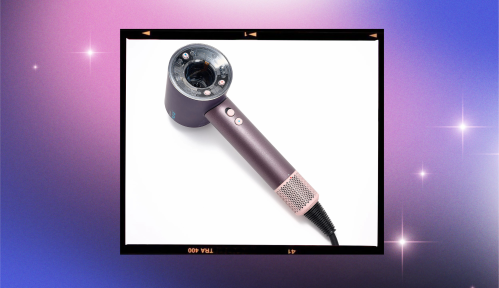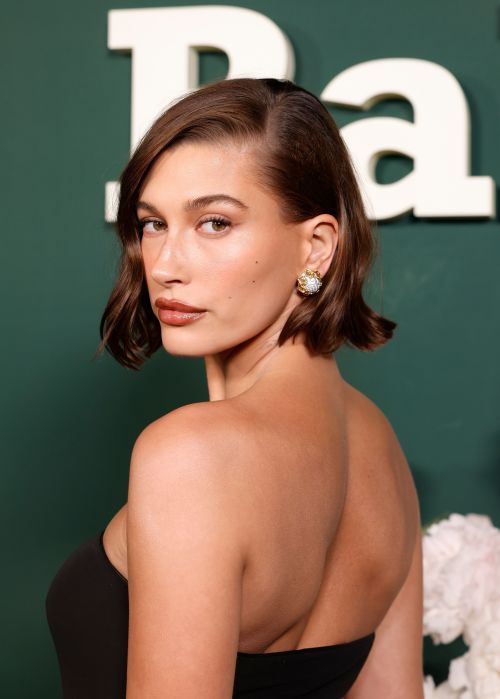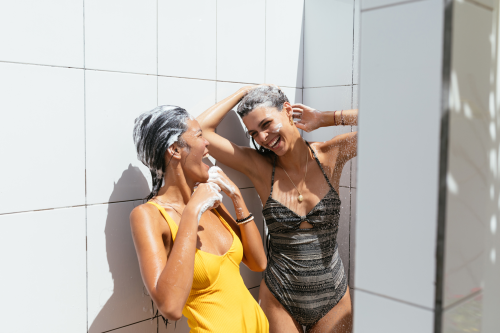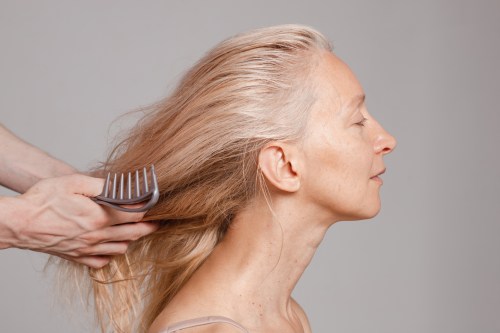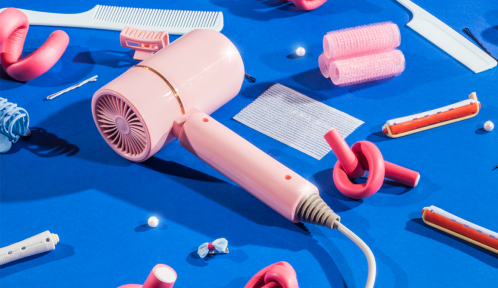Our editors independently select these products. Making a purchase through our links may earn Well+Good a commission
Wearing Your Hair Natural Doesn’t Automatically Make It Healthy—And Without Proper Care, It Can End Up Dull and Damaged
Having healthy textured hair has nothing to do with whether it's natural or chemically treated—it has to do with the effort you put in.
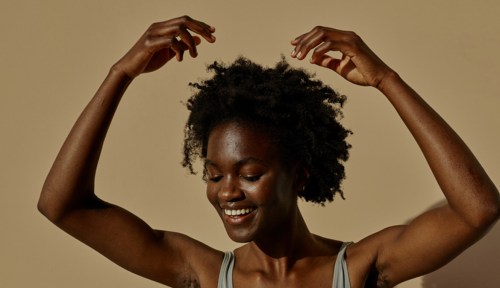
When I decided to go natural in 2014, I assumed that once I opted out of my regular relaxer appointments and bi-weekly silk presses, healthy hair was a guarantee. At the time, it seemed as though my ancestors had encoded hair wellness into my DNA, and all I had to do to reap the benefits was embrace my natural texture. But, as I’ve discovered in the near-decade since, it doesn’t work that way.
Experts in This Article
National Educator at Phyto and hairstylist.
Al Campbell is a hairstylist and Mizani artist.
CEO and co-founder of Myavana, a beauty technology company
board-certified dermatologist and hair specialist at Visage Dermatology
celebrity hairstylist and artistic director for Mizani
“Natural” hair has long been associated with simplicity, health, and—honestly—superiority, which explains why so many women (myself included) have opted to make the switch in recent years. Between 2017 and 2020, the percentage of Black women who desire to have their natural hair texture increased by 23 percent, and in that time, going natural became synonymous with embracing your truest self. Ditching relaxers was a way of shedding ties to Eurocentric beauty standards in favor of a lower-maintenance routine that was better for your hair. And for me, going natural seemed like a way to sit at the cool kid’s table while bringing my scalp and strands back to the healthiest versions of themselves.
Over the course of the past eight years, though, I’ve learned the hard way that “natural” doesn’t automatically mean “thriving.” Sure: Embracing your natural texture may mean that you don’t have to go to the salon every six weeks to touch up your relaxer. But it still requires just as much, if not more, effort to maintain—and a whole lot of love, energy, and attention to keep healthy.
‘Natural’ doesn’t necessarily mean ‘healthy’
Because of the potential risks associated with using chemical relaxers—without proper care, they can destroy the integrity of your hair; and the formulas have been loosely linked to different health concerns—many people believe that ditching them is all you have to do to bring your hair back to health. But according to Tippi Shorter, celebrity hairstylist and global artistic director at Mizani, that isn’t necessarily the case.
“The misconception is that natural hair is healthier,” she says. “It is if you’re putting time and energy into it, it’s not if you don’t.”
She recalls a former client who went natural in an attempt to fix the dryness she was experiencing as a result of chemical treatments, only to find that the transition had the opposite effect. “Her hair started breaking because her natural hair was tighter than she was expecting it to be—which means it was drier, it was thicker, it was coarser, and it required more maintenance and time than it did was relaxed,” she says.
Though there’s a wide population of DIY girlies going strong, going natural without establishing consistent healthy hair habits can cause damage. “Actually taking care of natural hair takes so much time, energy, and effort,” says Aicha Ouermi, hairstylist and national educator at Phyto. “Even with the whole going-back-to-natural hair movement that happened 10 years ago… it looked super easy when you looked at all those tutorials on YouTube, and a lot of people got caught up in that and didn’t realize they could actually damage their hair.”
Given that going natural isn’t necessarily the silver bullet of hair health we’ve been promised, many women have opted to return to relaxers to introduce ease and manageability into their routines. Google searches for “hair relaxer” have been on a slow and steady climb since 2020, and my TikTok feed is full of videos of girls who got a relaxer after nearly a decade of being natural.
However, even with this pique in interest, chemical treatments remain a controversial choice—girls are posting their relaxed hair videos on TikTok with trigger warnings. And since many people in the natural hair community still frown upon chemical treatments, war is waged in the comment section over whether or not chemically straightened hair can be healthy. But according to the pros, it absolutely can be. Having healthy textured hair has nothing to do with whether it’s natural or chemically treated. It’s all about the effort you put into maintaining it.
Your hair can be healthy in any state
Finding the right products for textured hair—whether you wear it natural or not—has gotten easier over time thanks to an increase in funding and support toward Black-owned brands. Once you’ve got a solid arsenal of products, Harris explains that you need to keep three key things in mind to maintain a “good” regimen.
“Number one is knowing what your hair needs,” he says. “Number two is understanding the frequency of taking care of your hair. Are you washing at the right frequency? Are you protecting your hair daily at nighttime? And then, finally, making sure you’re paying attention to how your hair is responding to the products you’re using. Are you applying the right products and technique based on how your hair is responding?”
How to keep natural hair healthy
The most important thing to keep in mind when caring for natural hair is that hydration is key. “Being able to restore moisture is very important when you have kinky, coily hair, so I’m a big believer in deep conditioning,” says Adeline Kikam, DO, board-certified dermatologist and founder of Brown Skin Derm. Additionally, sealing in that deep conditioner with a heat cap can help take things to the next level.
“When I knew I was transitioning to natural, I already had a good, healthy routine for my hair,” says Ouermi, who went natural 10 years ago after a decade of using relaxers. “Relaxed or natural, to me, it didn’t change my routine at all. Except for the styling part, which was totally different. If people don’t have a good regimen prior to being natural, it could definitely bring some serious issues.”
Take care to regularly detangle (ideally with a detangling conditioner), and opt to style with your fingers instead of a brush, particularly when hair is wet.
How to keep straightened hair healthy
“As long as you have good products, prep, protection, lifestyle, and maintenance, you can definitely wear your hair straight regularly without causing damage,” says Al Campbell, a Mizani artist and hairstylist based in Chicago. He adds that if you prefer wearing your hair straight, relaxing it is actually better for its health than heat styling. “Why not relax the hair and re-form the bonds to be permanently straight and healthy instead of permanently damaging them with heat?” he says.
To keep relaxed hair healthy, you’ll want to ensure you have bond-building products in your routine to counteract the effects of the chemical treatments. “Protein application is so important because chemical straightening breaks down the protein bonds in your hair,” says Candace Mitchell Harris, co-founder and CEO of Myavana, a beauty technology company. “With any treatment you’re doing, you have to consider ‘If I’m changing my hair in this way, how am I replacing it? How am I strengthening it?’ so that it doesn’t become further, further damaged.”
You can also reach for straightening methods that are a bit less harsh. For example, Ouremi loves the Phyto Relaxer ($65) because it’s made with all-natural ingredients and is made with bond-building ingredients. And a keratin treatment could be a great alternative to a relaxer because, these alter the bonds with heat instead of breaking them. Plus, after a few months, the hair goes back to its natural texture.
Additionally, monthly steam treatments (if not bi-weekly) can help your hair retain moisture. “Eighty percent of your hair problems are related to not retaining enough moisture—dryness is the leading cause of breakage,” says Harris. “Steam therapy really increases your moisture retention.”
Continuing on my own hair journey
After nearly a decade of bare-minimum DIY natural hair “care” (if you can call it that), I finally gave in and got my ass back in a salon chair. The management of my type-4 coils is now tasked to a patient professional who performs regular trims, deep conditioning, and steam treatments. I’m taking 2023 to focus on rehabbing my hair from years of neglect and doing lots of protective styles. And I might just fuck around and get a keratin treatment next year. Either way, I’ll be making sure I’ve got the basics of hair care covered, keeping my strands strong, nourished, and healthy in a way that’s manageable and realistic for me.
“Consider realistic regimens that you need to keep your hair healthy and then think about what makes you feel like your best self,” says Harris. “How do you want to wear your hair? Ultimately, it’s about what makes you feel your best, and that’s different for every person. Every person doesn’t have to be natural or wear curly hair—it’s about how you will look and feel your best.”
Sign Up for Our Daily Newsletter
Get all the latest in wellness, trends, food, fitness, beauty, and more delivered right to your inbox.
Got it, you've been added to our email list.
